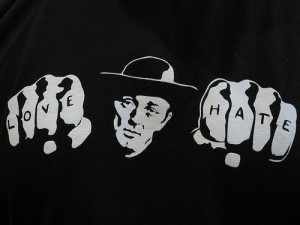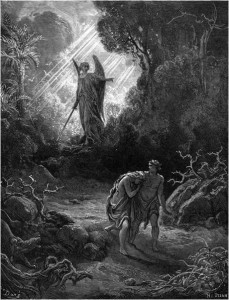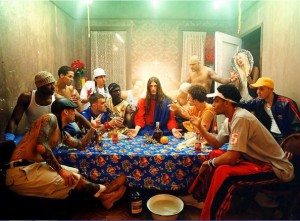Most of my Mormon friends aren’t actively involved with the church.
More than half of my core group of friends from high school haven’t participated since college. A surprising number of the friends I made on my mission and at BYU are now disenfranchised to some extent. And for the past 3 and a half years, through our involvement with Mormon Stories, Mormon Feminism, and various activism efforts, my wife and I have met and befriended a huge group of former, ex, ‘less-active’, unorthodox, ‘middle-way’ and ‘New Order’ Mormons. In all honesty, I have to say…
Apostates are some of the best Mormons I know.
Nearly all of these people have broken or regularly break the Word of Wisdom. Many have violated the law of chastity. Many don’t hold a temple recommend, and many wouldn’t care to worship there if they did. Almost all of them could be accused of “speaking evil of the Lord’s anointed”, and many of them have no testimony of the Book of Mormon, its translator, or the restored gospel. So it’s reasonable for you to ask, “How could you possibly consider them great Mormons?”
I think a substantial part my reason for saying so, is what I can only call a high level of spiritual maturity, possessed by even those who would now self-identify as atheists. It’s the maturity of a being that has obtained a knowledge of good and evil for themselves. Whether we are driven forth or set our feet upon that path with purpose, each and every one of us must leave the garden and enter a lone and dreary world. I do not equate leaving the garden with leaving the church. I think that’s what it looks like for some people, but not all. I love Mormonism and have attended church regularly for my whole life, but I would say I left the garden in high school. Do you suppose anyone understands the lone and dreary better than a wandering sheep who’s decision to leave the fellowship of the church brings only shunning and shame from those he supposed to be his friends and his family?
I think one of the problems with the “pattern” that correlation has set out for LDS youth is there’s less and less opportunity for them to obtain knowledge for themselves and leave the garden. Right out of high school (literally for 18 year old boys, now) they go out on a mission. And while a mission is an amazing growth experience; it’s such a controlled and supervised environment, that even though a lot of us are on our own for the first time, the KIND of growth we can experience is limited by our mandated activities. BYU becomes an extension of that environment for many returned missionaries and as a result, many Mormons are now well into and even past college, often married with children before they have to encounter facts about church history or present church policy that give them substantial pause. Allow me to draw a parallel to our polygamous ancestors when I offer that at some point, some are simply too heavily invested in the principle to question it.
So we have the analogy of the faith shelf. And we pile on it the things we can’t deal with until we can’t ignore them anymore and after the crash, we see something that hadn’t been obvious to us before. Good and evil are not the concrete realities we once believed. There’s almost nothing in the fallen world we can identify as universally good, and it’s just as hard to identify universal evil.
One of the things that the temple narrative has helped to make clear to me, is that good and evil, agency and accountability are almost never clear-cut. Even in Mormonism’s fundamental allegory, choice is established as a complex, rather than a simple reality. What Eve did was decidedly the most important act of disobedience in our canon. Many past leaders who place a high value on the principle of obedience have had to do some significant intellectual parsing of the terms sin and transgression, to try and get around the fact that is plainly manifest in the Eden narrative… that our eternal progression hinges on an act of blatant disobedience to the Gods. Notice that there’s no blaming going on. Both Adam and Eve supply a reason for their act, but plainly admit their fault to the Lord, “and I did eat.”
It’s also vital to distinguish that Eve was not duped. She was beguiled. According to Dr. Nehama Aschenasy, the Hebrew word that King James translators rendered as beguiled “is a rare verb that has rich and connotative meanings, indicating an intense multilevel experience evoking great emotional, psychological, and/or spiritual trauma.” He suggests it was a catalyst for Eve to undergo a deep internal process, wherein she pondered at length the consequences of her prospective choice and its relation to her ultimate purpose in the garden. That sounds like a faith crisis to me.
It’s also important to note that the tree is never identified as a symbol of evil or wrongdoing. The language surrounding the tree is overwhelmingly positive. “the tree was good for food, and that it was pleasant to the eyes, and a tree to be desired to make one wise”. Furthermore, God told Adam and Eve that it was THEIR tree. “Nevertheless thou mayest choose for thyself, for it is given unto thee.” In the English sentence it appears as if the “it” pronoun refers to “choice”, but in the Hebrew it is clearly referring to the tree. God was, in essence telling them, “I am now commanding you to avoid this particular tree, but like all of them here, it’s YOUR TREE and you can do what you like with it… but remember that I told you no”. This is the equivalent of your mom telling you, “Don’t eat your halloween candy before dinner, because it’ll spoil your appetite… buuuut, it is your candy and you can do whatever you want with it.”
A final element of the story we often miss is that Eve sought and probably received revelation. Genesis scholar, Vivian McConkie Adams, explains that ‘the word saw [in Genesis 3:6] comes from the Hebrew word ra’ah, which has direct relation to the Hebrew word ro’eh, which means seer or vision. Such word play, which is common in Hebrew, suggests that Eve had a prophetic spirit and may have received seeric revelation from God as part of her tutoring in the garden.” If we take the Book of Moses account, we notice something else significant. Eve’s remarkable revelation and prophesy came after her faith crisis and disobedience, probably long after (they have children). That parallels my own experience that we sometimes must act without knowledge before we can obtain it; to borrow Spencer W. Kimball’s words, “Faith precedes the miracle”.
 The world has invented narratives that cast her as the fool, the simpleton, the bystander, and even the whore. Even in the church, we try to have her both as the foresighted heroine and the servile mute. But Eve, the mother of all living is what she always has been: an incredible woman who was brave enough to see that her disobedience was the only way forward. I think we should bear her in mind before we decry the efforts or motives of women who wear pants to church or ask to attend priesthood session… acts that don’t even constitute disobedience.
The world has invented narratives that cast her as the fool, the simpleton, the bystander, and even the whore. Even in the church, we try to have her both as the foresighted heroine and the servile mute. But Eve, the mother of all living is what she always has been: an incredible woman who was brave enough to see that her disobedience was the only way forward. I think we should bear her in mind before we decry the efforts or motives of women who wear pants to church or ask to attend priesthood session… acts that don’t even constitute disobedience.
If life were only about choosing right and wrong, with rewards for correct behavior and punishment for incorrect, I truly think most of us would catch on. Almost all choices, though, upon closer examination are actually a choice between two slightly differentiated possibilities. Often it’s a choice between the greater of two goods, or the lesser of two evils. And by choosing any one reality we, by necessity, omit all others. Eve’s courageous choice brought both tremendous positive AND negative consequences into being. Obtaining a knowledge of good and evil necessarily brings the understanding that good and evil are actually abstract concepts, as are choice and accountability. Sometimes we DO ask for bread and receive stones, and sometimes our loaves come with serpents instead of fishes. Those who seek God with a pure heart sometimes live in crushing poverty their whole lives, while those who exploit the meek and lowly sometimes prosper phenomenally. Sometimes good women with no greater desire in the wide world, miscarry their babies or fail to conceive them at all. Sometimes children (the only innocents among us) are raised in situations of almost constant abuse or neglect. Sometimes the just are imprisoned and the evil go free. That is the true nature of our world. That is the substance of a knowledge of good and evil. One cannot simply go and do, like Nephi, without eventually coming up against a Laban moment, where good is now evil and evil is good, and the sword is in the last place we would want it… in our hand. One of the realities we have to wake up to is that just like life, the scriptures are positively brimming with contradiction. I personally think that’s one of the things that make them beautiful and useful. Prayers aren’t always answered. Faith isn’t always rewarded with knowledge. Sometimes people ask and do not receive. Sometimes they knock on doors always closed, and yet….
I still believe in a loving and perfect God. I believe I am capable of love because he first loved us. I have a family here on earth and I want to share my life with them through all eternity. I believe that a wildly imperfect young man received revelations from God and tried to offer them to the world in his wildly imperfect way, and I love those revelations. I love the wildly imperfect kingdom of God we have established on Earth with our meaty hands, and I want nothing more than for it to become a Zion. I have covenanted literally everything I have and will ever obtain to making that happen. I believe that’s the most wildly irresponsible promise I’ve ever made, and I’m deeply grateful that I was given the opportunity to make it.
I believe these things and I follow God in the imperfect way I do, because I know he accepts me as I am. Jared, “as-is” is the person Jesus died for. When I am exalted I will not be identical to any other exalted being, I will be the best possible version of who I already am. Paul says that the just shall live by faith, and Jacob says we are saved only in and through the merits, mercy, and grace of the Holy Messiah. For that redemption to have any effect in our lives, every one of us must first leave the garden. What that looks like will be different for everyone. I look like almost any other Mormon. I go to church. I teach Elders quorum. I love my family. I try to be like Jesus.
As a person who has studied church history extensively and sees the many problems in contemporary church policy; and as someone who has found a way to take Mormonism on my own terms… I find it my almost daily calling to help struggling saints in one capacity or another, take on their faith crisis. That’s what I try and do as a blogger here at rational faiths. As Joanna Brooks is fond of saying, “Mormonism doesn’t just wash off”. Each of us must learn to take the church and God, on our own terms and find where our Mormonism will sit in our lives. Paul spoke thus of our imperfect, mortal view,
“For we know in part, and we prophesy in part. But when that which is perfect is come, then that which is in part shall be done away. When I was a child, I spake as a child, I understood as a child, I thought as a child: but when I became a man, I put away childish things.”
I sincerely hope that as saints, in a new year, we can put away the narrative as we learned it in primary, and apply the principles of the gospel in real and meaningful ways in our actual lives. I hope that we’ll care less about to what extent the scriptures are literally true, and more about how we can use them to transform lives and become better people. I hope that we’ll worry less about the company we might keep with sinners and remember instead that we are all sinners.
To the faithful: Remember, remember that those around you who have lost their faith, have not necessarily lost their way. In fact, it’s those peoples’ influence in my life that has most helped me find my own way. We have a great deal more to learn from each other than we know.
Happy New Year.






Brilliant essay, Jared. Worthy of being read, re-read and re-read again.
Thank you so much for this!
Great post Jared. I loved the last paragraph, “Remember, remember that those around you who have lost their faith, have not necessarily lost their way.”
Love it. Too bad the intended audience will never see it.
Well, then share it with the appropriate audience.
Very thoughtful, beautifully worded, Jared. I have never considered that removing the issues placed on “my shelf” to be a crisis of my faith. My faith is not LDS, Inc. My faith is my personal relationship with my Heavenly Father and Jesus Christ. The Church was only one of the vehicles that helped me develop it. My FAITH is as strong as it has ever been – and “leaving the garden”, as you so eloquently expressed, means I have actually finally matured enough spiritually to accept the fact my religion is NOT what it professes to be – BUT that’s OK. After all, my relationship with my Father in Heaven & Savior is still strong as ever, and continuing to put blinders on so as not to see those items on my shelf, well – I “outgrew” the need to do that. You are right, my friend – Spiritual Maturity.
I love this. Thank you!
Jared, beautifully said, and beautifully written. I have two children who have left the church and it crushes me. But, I can have hope that they will return to the garden with an even greater knowledge, commitment and attitude of service.
Thank you for your uplifting thoughts.
Jared, this is fan-freakin-awesome. I love it. Thank you for the wonderful thoughts and insights.
So, I love this so much I’ve reposted a portion in my own blog post, hope you don’t mind my quoting you. It literally is my favorite.
My friend posted me this artical on my Facebook . Man I am so impressed by this!!! I loved it a lot more reason why am so happy to be a convert and a member in the church!!!!
This was really good. During my life time I have been in and out of church. Some of the best people I know are not active LDS and non LDS. The non LDS and inactive LDS put church/Temple attending LDS to shame because the non LDS and inactive LDS are more moral, honest, trust worthy, not snobs, not Holier Than Thou, more sincere more friendly, and willing to do anything to help, and not in the right cliques (church is like high school). I know I am a sinner and need to work on many things. I admit it.
The LDS who are at church every Sunday and go to the Temple on a regular basis are some of the worse people I have come across. My family and I have had some very bad treatment by members of our ward and the leaders. My testimony of the doctrine keeps me going to church so that I can keep my Temple recommend. Hugh Nibley was absolutely correct when he said that there will be very few LDS who make it to the CK. In my experience the majority of LDS draw near to God and Christ with their lips and their hearts are far from God and Christ. Culture rules in the LDS church, not doctrine, and true Christ like behavior and love does not exist with the majority of the members.
And during my times of inactivity (because I could not stomach the people and their behavior in my ward and got tired of bad treatment)I was treated like I was an Apostate. Yep, Christ like love. NOT!
I meant to say this when I fist read it, but this blog post is simply wonderful. Thanks so much for sharing it and props to you for expressing these thoughts so well.